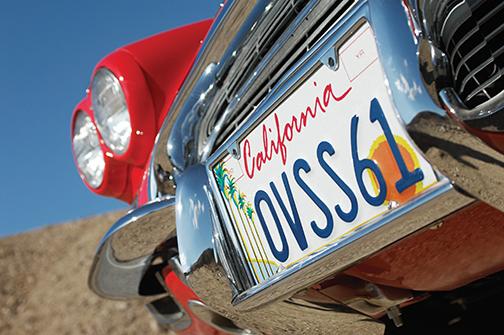
On Sept. 18, a San Diego judge denied technological entrepreneur Michael Robertson’s request to access his own license plate data from police scanners. The decision was a result of a yearlong lawsuit against the San Diego Association of Government and the allocation of data through license plate scanners and cameras through 10 local police departments. The request was denied because under California’s Public Records Act, disclosure of such information interferes with police investigation.
I have to ask, what kind of police investigation necessitates the scanning of 49 million local license plates and citizens? Not one that’s ethical.
This Orwellian invasion into our personal freedom is in violation of our constitutional right of protection against these unethical surveillance tactics as made obvious in the Fourth Amendment, which plainly states we have a right “against unreasonable searches and seizures” without a “probable cause.”
Whenever we try to start dialogues about the state of police surveillance in a post-NSA age, those who argue against or question the ethics of surveillance are usually met with the mockery and ridicule reserved for conspiracy theorists.
To an extent, I get it. A majority (56 percent to be specific) of Americans agree with the NSA’s tracking of phone calls and 62 percent deem it acceptable for the government to intrude on their privacy if it involves terrorism investigation. Those who oppose surveillance do not hold similar views with the majority. Terrifyingly enough, mass surveillance has become normalized.
Living in a post-Edward Snowden world, there’s a general awareness now that privacy in a digital age is a transactional concept. We have been subjected to the idea that we must trade in our privacy for security and safety, normalizing and necessitating surveillance.
Despite exposure to pop culture dehumanizing about police surveillance, such as George Orwell’s “1984” to the dystopian sensation “The Hunger Games,” we’re able to live comfortably with this level of surveillance. We’re assured mass and total surveillance can only thrive in science fiction novels and totalitarian governments.
This decision made by the judge to deny access to personal license place data to Robertson indicates these warnings of a surveillance state may no longer exist in the realms of science fiction or speculation. They have become a reality.
As of now, police departments utilize technology, such as facial tracking cameras and license plate scanners, to carry out criminal investigations. Seven out of 10 police agencies use these scanners and collectively contribute three million scans of license plates per week along with their locations to a database, which includes more than 455 million scans.
The extent in which the police department and our government have employed their illegitimate use of surveillance tools has overstepped the need for security and menaces our right to privacy, while increasing the risk of discrimination, coercion and selective enforcement by the police.
Robertson agrees this issue is in violation with our rights.
“They keep two years of data and store it without a warrant or permission,” Robertson said. “When an officer wants to access your phone, or any private property for that matter, they have to state what their ‘probable’ cause is. For this data, there is no probable cause. Without one, as an innocent citizen, there shouldn’t be police profile data on me.”
There is no tangible cause for San Diego police to scan hundreds of license plates a day.
“You can run up to two or three thousand license plates a day,” Deputy Scott Roller said in a report last November.
You’d think in order for the police to scan thousands of license plates per week and store it in a database for two years, there would have to be existing evidence of mass criminal activity.
The fact is there isn’t a reason, which is what makes this such an injustice. Our law falls back on the general rule that everyone is innocent until proven guilty. By allowing this policy to investigate one and all, we are assuming everyone is guilty without a trial.
Furthermore, this intrusion into our rights only progresses from here. A news report from August reported how the San Diego Police Department looked into buying cell-phone scanning technology that collects data on calls and locations.
“San Diego is the surveillance capitol of the U.S.,” Robertson said. “The question here lies in how they are storing this data, how long and who gets access.”
There is no question as to the scope of surveillance in San Diego. The inaccessibility of personal license plate data leaves a lot of these questions up to debate, leaving us to question how transparent our authority systems actually are.
Should we allow for surveillance technologies and programs to go unchecked in lieu of our constitutional rights? We support a system that allows for this power imbalance between the watched and the watchers. Such technologies must be restrained by rules to be used to maintain justice without invading our rights. For police who exist to “protect and serve” by enforcing such technologies without a warrant or permission, the ambiguity in regard to the ethics and imbalance of surveillance technology should urgently concern all of us as we ask, “do we feel any safer than before?”








